初中英语人教版八年级下册Unit 10 Section A 4a-4c
- 格式:doc
- 大小:23.50 KB
- 文档页数:3
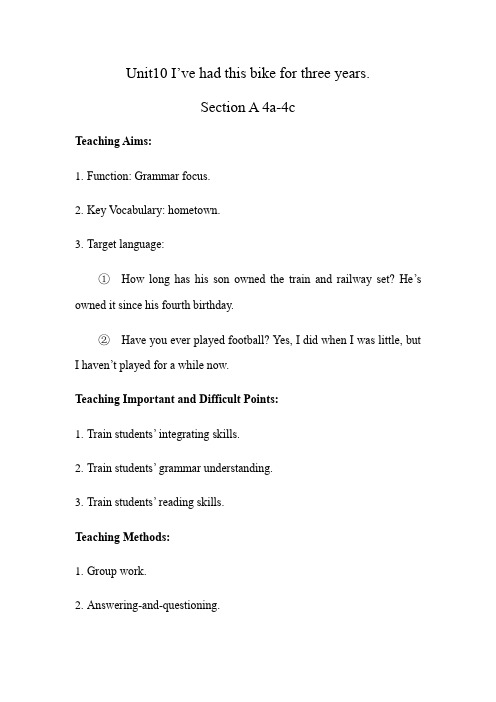
Unit10 I’ve had this bike for three years.Section A 4a-4cTeaching Aims:1.Function: Grammar focus.2.Key V ocabulary: hometown.3.Target language:①How long has his son owned the train and railway set? He’s owned it since his fourth birthday.②Have you ever played football? Yes, I did when I was little, butI haven’t played for a while now.Teaching Important and Difficult Points:1.Train students’ integrating skills.2.Train students’ grammar understanding.3.Train students’ reading skills.Teaching Methods:1.Group work.2.Answering-and-questioning.3.Practice.Teaching Aids:1.PPT.2.A computer for multimedia use.3.Some cards.Teaching Procedures:Step 1. Review.1.Have a look:①—How long have you lived here? —I’ve lived here for twenty years. Yes, I’ve been here since 1976.②He has just bought a new house in the city, but ever since he moved in, he has had trouble with cars and their owners.③We haven’t seen each other since last week.④My parents and I have been in Hong Kong for two days.2.Read “Grammar Focus”.Step 2. Practice: choose “for” or “since”.1.—How long have you had that bike over there?—I’ve had it ____ three years.2. Jeff has had his bike ____ more than 10 years.3. Yes, I’ve had it ____ seven years.4. Amy has had her favorite book ____three years.5. Amy has had the toy bear ______ she was a baby.Step 3. Grammar.1. 现在完成时表示动作或状态在过去已经开始,持续到现在可能还要持续下去.*常和for, since引导的时间状语连用,谓语动词多用延续性动词*延续性动词:live, teach, learn, work, study, be open, be closed, keep, have, be away, be married, be asleep, be ill等.2.短暂性动词(come, go, leave, buy …)可以用于现在完成时。
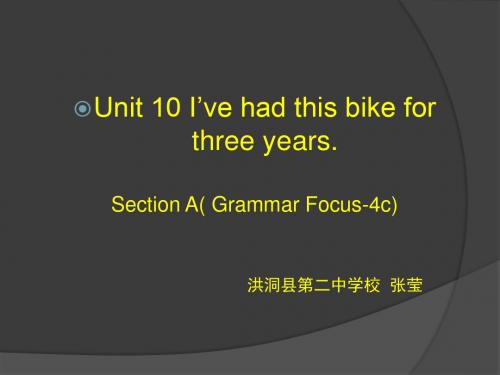
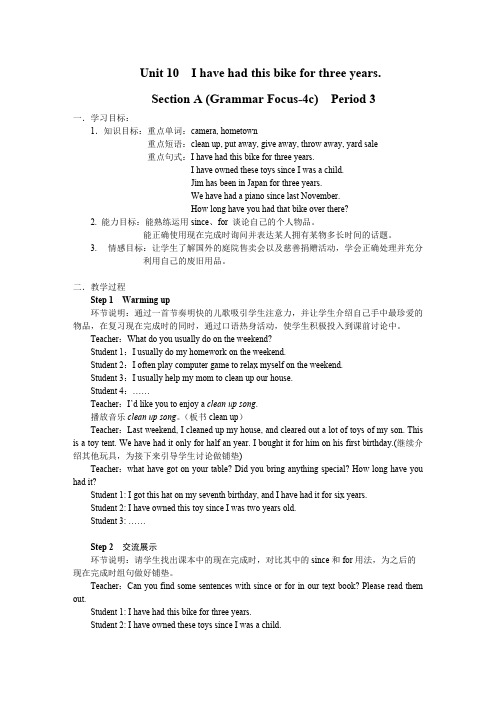
Unit 10 I have had this bike for three years.Section A (Grammar Focus4c)Period 3一.学习目标:1.知识目标:重点单词:camera, hometown重点短语:clean up, put away, give away, throw away, yard sale重点句式:I have had this bike for three years.I have owned these toys since I was a child.Jim has been in Japan for three years.We have had a piano since last November.How long have you had that bike over there?2. 能力目标:能熟练运用since、for 谈论自己的个人物品。
能正确使用现在完成时询问并表达某人拥有某物多长时间的话题。
3. 情感目标:让学生了解国外的庭院售卖会以及慈善捐赠活动,学会正确处理并充分利用自己的废旧用品。
二.教学过程Step 1 Warming up环节说明:通过一首节奏明快的儿歌吸引学生注意力,并让学生介绍自己手中最珍爱的物品,在复习现在完成时的同时,通过口语热身活动,使学生积极投入到课前讨论中。
Teacher:What do you usually do on the weekend?Student 1:I usually do my homework on the weekend.Student 2:I often play computer game to relax myself on the weekend.Student 3:I usually help my mom to clean up our house.Student 4:……Teacher:I’d like you to enjoy a clean up song.播放音乐clean up song。
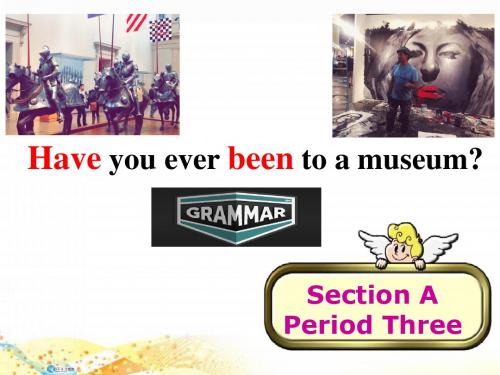
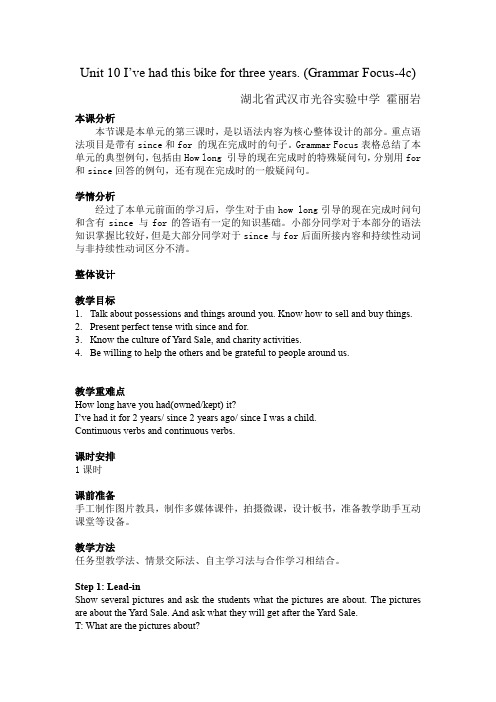
Unit 10 I’ve had this bike for three years. (Grammar Focus-4c)湖北省武汉市光谷实验中学霍丽岩本课分析本节课是本单元的第三课时,是以语法内容为核心整体设计的部分。
重点语法项目是带有since和for 的现在完成时的句子。
Grammar Focus表格总结了本单元的典型例句,包括由How long 引导的现在完成时的特殊疑问句,分别用for 和since回答的例句,还有现在完成时的一般疑问句。
学情分析经过了本单元前面的学习后,学生对于由how long引导的现在完成时问句和含有since 与for的答语有一定的知识基础。
小部分同学对于本部分的语法知识掌握比较好,但是大部分同学对于since与for后面所接内容和持续性动词与非持续性动词区分不清。
整体设计教学目标1.Talk about possessions and things around you. Know how to sell and buy things.2.Present perfect tense with since and for.3.Know the culture of Yard Sale, and charity activities.4.Be willing to help the others and be grateful to people around us.教学重难点How long have you had(owned/kept) it?I’ve had it for 2 years/ since 2 years ago/ since I was a child.Continuous verbs and continuous verbs.课时安排1课时课前准备手工制作图片教具,制作多媒体课件,拍摄微课,设计板书,准备教学助手互动课堂等设备。
教学方法任务型教学法、情景交际法、自主学习法与合作学习相结合。

Unit 10I've had this bike for three years.Section A(3a-4c)Teaching Key Points【教学重点】The vocabulary:junior,clear,bedroom,own,part,while,railway,certain,truthful,hometown,no longer,to be honest,junior high school,clear out,part with,as for Target language:1.We've decided to each sell five things that we no longer use.2.As for me,I didn't want to give up my football shirts,but,to be honest,I haven't played for a while now.Teaching Difficult Points【教学难点】The usage of “no longer,to be honest,clear out,part with,as for”.Teaching Aids【教学工具】an English book,a tape recorder and CAITeaching Steps【教学过程】★Step 1Preview and perception【预习感知】Ask the students to read the vocabulary and target language.Ⅰ.英译汉。
1.junior high school____________2.part with ____________3.as for ____________4.no longer ____________5.to be honest ____________6.clear out ____________Ⅱ.根据汉语意思完成下列句子。
动词时态教学设计涿鹿县初级中学王霞Teaching Aims and Demands:1.To revise the eight types of tenses that we've learned.2. Moral object: Practice makes perfect.Teaching Key Points and Difficulties:1. The usages and forms of the tenses.pare different tensesTeaching Aids:Multimedia and some cards.Teaching Procedures.Step1.Greet the class.Step 2. summary and Exercise1、现在进行时1).表示说话时正在进行的动作.常和now,Look!Listen!连用。
例:I am reading a book now.Look!They are having a basketball match.It's 7:00 pm. The Greens are watching TV.2).表示现阶段正在进行着的动作。
例:Mr. Green is writing another novel.3).表示在近期按计划或安排要进行的动作。
即用现在进行体表示将来要发生的动作。
但一般要与将来时间连用,而且仅限于少量动词。
例如:come,go,start,arrive,leave,stay等。
例:Mr. Smith is leaving for London tomorrow.2、过去进行时1).表示过去某个时刻或某一阶段正在进行的动作。
常与at this time yesterday, at that time, at eight yesterday等连用。
例:What were you doing at three o’clock yesterday afternoon?2).用于when,while 引导的时间状语从句中。
用过去进行时表示较长的动作。
过去进行时可用于主句,也可用于从句。
例:I was doing my homework when someone knocked at the door.While he was waiting at the bus stop,the traffic accident happened.(While 后的分句必须用进行时)While I was reading,my sister was sleeping.(表示对比,都用进行时)3).用于表示过去将来的动作。
常用在间接引语中。
例:I asked him whether he was coming back for dinner.3、一般现在时1).经常性或习惯性的动作,常与表示频率的时间状语连用。
如every day, often , usually, sometimes, always, once a year等连用。
例:I leave home for school at 7 every morning.2).客观真理、客观存在、科学事实。
例:The earth moves around the sun.Shanghai lies in the east of China.此用法出现在宾语从句中,主句是过去时,从句谓语也要用一般现在时。
例:Columbus proved that the earth is round.The teacher told us the earth moves around the sun.3).在时间、条件状语从句中表示将来的动作。
例:If it rains tomorrow, I'll stay at home.4). 用于某些表达法中表示现在正在发生的动作或存在的状态。
例:Here comes the bus.There goes the bell!4、一般过去时一般过去时表示在确定的过去时间里所发生的动作或存在的状态。
时间状语有:yesterday,last week,an hour ago,the other day,in 1982等。
例:He went to school an hour ago.When I was a child,I often played football in the street.请你注意:一般过去时表明的是过去发生的事,和现在不发生关系。
一般过去时的时间状语应该是表示过去某个时间的词或词组,如:yesterday,last month,in 1999,two days ago等,绝对不可与recently,in the past 10 years,this month等连用,因为这样的时间状语都与现在有关系,应该用现在完成时或一般现在时。
5、一般将来时一般将来时表示将来某个时间要发生的动作或存在的状态。
常与表示将来的时间状语连用。
如:tomorrow,tomorrow morning,next week(year,term…),in (two days…),soon,the day after tomorrow等。
例:I will go to Beijing tomorrow.1)will/shall+动词原形2)be going to+动词原形3)用短暂性动词的现在进行时表示一般将来时6、过去将来时过去将来时表示从过去的某一时间来看将要发生的动作或存在的状态。
它常用于宾语从句中。
例:He told me he would go to Beijing.He said the train was leaving at six the next morningShe said she was going to start at once.7、现在完成时1).表示过去发生或已经完成的某一动作对现在造成的影响或结果。
常用的时间状语:already,never,just,before,recently,never, yet, in the last few years 等连用。
例:I have lost my key.(说明过去某时丢的,现在还未找到。
)2).表示过去已经开始,持续到现在的动作或状态。
常与for+时间段,since+时间点连用。
要求动词是延续性的。
例:I have known him for ten years.3).表示从过去到现在之间曾经经历过的事。
例:We have been to the Summer Palace twice.They are not here. They have gone to the Summer Palace.注意:因为含有for加一段时间或since加一个时间点这样的时间状语的完成时,有动态和延续性的特点,所以不能使用终端动词或瞬间动词。
例:The old man has been dead for 2 years.(过去分词做表语表示状态,可以延续)The old man died 2 years ago.8、过去完成时表示过去某时开始,一直持续到另一时间和状态。
即动作完成于某个过去时间之前。
常用的时间状语:由by,before等词构成的表示时间的介词短语。
“过去的过去”这种逻辑关系常通过上下文体现出来,而不一定受某个时间状语的限制。
例:We had not heard from him by the end of last year.She said she had learned French for six years.Step4. Practice and make sentences.Step5. Do some exercises.1.They _________since the factory opened.A. had worked hereB. have worked hereC. are working hereD. worked here2.---Have you read this book?----Yes. I ________it two weeks ago.A .is reading B. have read C. will read D. read3.If he _________harder, he will catch up with us soon.A. studyB. studiesC. will studyD. studied4.---May I speak to John?---Sorry, he ________Japan. But he _________in two days.A. has been to, will come backB. has gone to, will be backC. has been in, would come backD. has gone to, won't come back5.Bad luck! We _______Mount Huang when it rained heavily.A. climbedB. were climbingC. are climbingD. have climbed6.Keep quiet, please. They ________a meeting right now.A. haveB. hadC. are havingD. have had7.Lily said that she________ on the new dress the next day.A. putB. will putC. would putD. have put8.By the time I got there, the train ______ already _______.A. have, leftB. has leftC. was, leavingD. had, left.Step6. Summary and homework.。